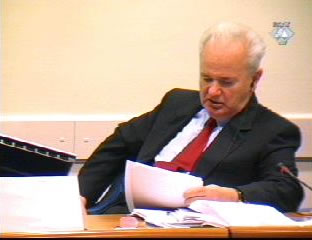Home
“SELF-INFLICTED INJURIES” IN SARAJEVO
Former JNA military prosecutor in Sarajevo, General Radomir Gojovic testifies at the trial of Slobodan Milosevic how in 1992 “the Muslim forces shelled themselves” and how “Muslim snipers recognized Serbian men by their caps and Serbian women by the black clothes they wore.”
 Slobodan Miloševic during the cross examination
Slobodan Miloševic during the cross examination In the first three days of May 1992, JNA lost 26 officers and soldiers in Sarajevo, without firing a single bullet - this is what General Radomir Gojovic claimed today at the trial of Slobodan Milosevic. When the war broke out in BH, he was a military prosecutor in Sarajevo. The witness agreed with the proposition of the accused that the JNA in those days in Sarajevo “did not even exercise its elementary right to self-defense.”
Gojovic’s testimony, as Milosevic indicated, should focus on what the military judiciary in the FRY did in 1999 to prosecute the Yugoslav Army soldiers who committed crimes against the Albanian population or their property in Kosovo. Through Gojovic’s testimony, Milosevic wants to challenge the prosecution’s argument that he bears command responsibility for failing to prevent or punish the crimes in Kosovo. General Gojovic got to that topic at the end of his testimony today, which mainly dealt with his experience and observations in the period from April to June 1992 in Sarajevo.
At one point, the judges found “difficult to understand what the relevancy” of the witness’s Sarajevo experience and observations was, as Presiding Judge Robinson admitted at one point. However, Milosevic managed to convince them that they were relevant. As he explained, “Muslim forces shelled their own buildings and civilians over the witness’s head, and the indictment alleges that I am responsible for that.” The witness previously claimed that he had witnessed the shelling of civilian buildings in the city from the positions held by Muslim forces in Mojmilo. The shells flew over the Viktor Bubanj barracks, where the seat of the Military Court was at the time. Then, he added, “they would report that the army was shelling fiercely the city.”
General Gojovic also recounted a story he had “heard from an eyewitness” regarding the infamous massacre in Vase Miskina Street in late May 1992. The eyewitness, he claims, passed through that street immediately before the explosion as saw “the cameras being set up”. When he returned later, he saw the killed and wounded, but he did not see any mark of the impact of a shell on the sidewalk. The witness claims that the next day people were “knocking away on the asphalt with hammers to create some impact marks.”
When Judge Bonomy asked him to identify the person who had told him that, General Gojovic said he had heard it from a man by the name of Nedeljko Lizdek, a military police officer who unfortunately died in 1994. Despite the objection raised by the prosecutor that this was in fact “anecdotal hear-say evidence”, the judges decided to accept Gojovic’s testimony about the massacre in Vase Miskina Street; they will decide later what weight to give to it.
General Gojovic presented an interesting theory about how the “Muslim snipers” recognized Serbs in the streets of Sarajevo”: women by their black clothes and men by their caps.
General Gojovic’s testimony will continue tomorrow.
Linked Reports
- Case : Milosevic Slobodan - "Kosovo, Croatia and Bosnia"
- 2005-03-10 FREE INTERVIEWS IN THE PRESENCE OF THE AUTHORITIES
- 2005-03-09 UNWILLING PROSECUTION WITNESS WAS “MISINTERPRETED”
- 2005-03-09 WHO FLED KOSOVO AND WHY?
- 2005-03-16 “SIGHTING WEAPONS” ON ALBANIAN CIVILIANS
- 2005-03-22 HOW DID THE BODIES FROM IZBICA ENDED UP AT PETROVO SELO?
- 2005-03-23 JUDGE MARINKOVIC’S VERSION OF THE RACAK CASE
